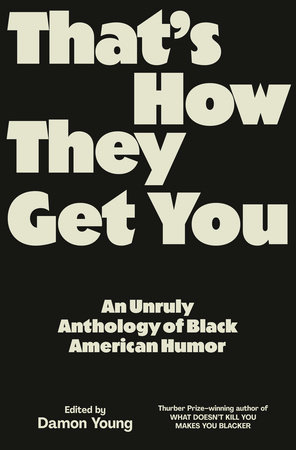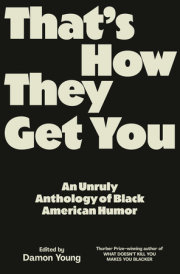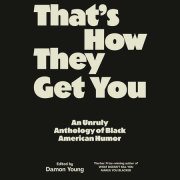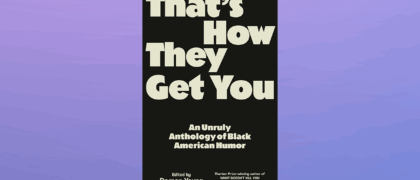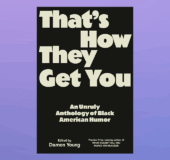No One Makes “Yo Mama” Jokes After the Funeral
Hanif Abdurraqib
Which is its own kind of joke. I don’t make the rules about the decorum of the dozens, but I got good at the dozens because I knew I didn’t want to fight. I could have fought, probably. I was the youngest of four, with two aggressive older brothers, and so I got my ass kicked plenty, and through a series of ass-whuppins, one learns how to at least hold one’s own. At least survive. At least not get beaten up in front of a crowd. And jokes could delay the physical interaction if an eager enough audience was present. I got good at disarming a fist before it detonated. Though I wasn’t entirely opposed to violence. There’s an intimacy in the moment before a fight unfolds that I look back on now and find entirely romantic. Two people, circling each other, face-to-face, trying to—through that close looking—gauge each other’s interest in limits and limitations, in line-crossing. Neither of them, given the day, all that particularly interested in fighting, but perhaps interested in seeing which of them might throw the first punch. The punch, too, another type of invitation for intimacy, for what doors it might open, how it might send two people tumbling to the ground, in each other’s grasp.
But make no mistake, the dozens, too, is a performance of the intimate. All the best trash talkers I knew did their research, knew how exactly to hurt someone but not incite rage. To push someone to the point of being wounded enough to relent. The thing with the dozens is, one must get on a roll. It’s like anything else. You respond to what the audience wants. If you get off a run of jokes and the audience is laughing with enough volume and ferocity, it almost doesn’t matter what you’re actually saying. Just the sound of your voice, performed with enough comedic melody, makes people believe that what is being said is already building atop the existing monument of jokes.
I got good at the dozens, too, explicitly because I had very little interest in hurting people. I had a code, even as a reckless and barely thoughtful adolescent. I stayed away from parents, from siblings. I could do twenty minutes on just one pair of busted-ass kicks I saw you wearing one time. Even if you didn’t have them on at the time you became my target, I could summon them, make people believe you were wearing them.
But I was also a good sport. When people joked about my mother, her small stature, her hijab, the gap between her teeth, I didn’t react to it in any way that would escalate the scene. The way I saw it, no one present in the dozens circle or on the school bus or in the locker bays knew my mother intimately, and so it was a waste of a joke. Like shouting at a ghost that only you and one other person can see.
And speaking of ghosts, I am at the point in my life where I have lived far longer without my mother than I have with her. At the point where, some days, I can’t remember her voice as much as I can remember the sound of her laugh. Which was loud, which rattled walls and arrived in rooms several seconds before she did. She was a loud woman, despite being under five feet tall. Walked with volume, spoke with volume, in joy and in rage. A woman of immense volume. What I remember most from the months after she died was getting used to the silence. Even as a teenager, I lived a life defined by the sounds that furnished my life. When the lovingly loud person makes an exit, the silence is where the grief does its best living. When something was funny on the television and my family would laugh, there would be an absence. There was an absence of feet tumbling down the stairs, of belongings and grocery bags being thrown to the ground upon crossing the threshold of the home.
My mother died in the summer before my ninth-grade year, in a time when news spread around a neighborhood, and then spread to a school, and then spread, slowly, through a whole city. High school is a place of becoming, and I arrived fully formed in the mind of many. I was the kid with the dead mom, and that was my existence.
What happened first on the block, and then in the lunchrooms and the hallways where the dozens got played, was that the jokes would escalate, as they often did, and then someone would reach for the mother, the way you wind up before throwing what you believe to be a knockout punch. But then there would be a whisper, someone informing my opponent of the news. Their face would fall a bit, and they would stumble toward another, less potent joke.
In a way, this was how I first came to understand mercy, though it was a mercy I found myself despising. In my home, I was fine with being defined by absence, but in the world, beyond my house, I wanted to fight through it, to be a target beyond my grief.
The first time I encountered someone who didn’t know that my mother had died and wasn’t exactly concerned with the mechanics of grief, they offered up a “yo mama” joke that was so mundane, I can barely remember it. Something about how ugly she was, even though this person had never seen her. He got the joke out so quickly, it couldn’t be stopped. There was a pause, a collective gasp, among the spectators. When he realized what he’d done, after someone shouted out, “She’s dead, man, come on,” he paused, became tentative, slightly sad and guarded, expecting me to snap, throw a punch.
What I remember is the unclenching of my fist. And, through the shocked silence, I threw my head back and laughed, loud. Not at the joke, but at the breaking down of an impossible wall, the freedom on the other side. My mother, sung back to life in a chamber of intimacy.
(My laughter caught my opponent off guard, which was the perfect time for me to rebound, swooping in to clown his busted-ass British Knights.)
"No One Makes 'Yo Mama' Jokes After the Funeral" by Hanif Abdurraqib. Copyright © by Hanif Abdurraqib. All rights reserved.
Copyright © 2025 by Damon Young. All rights reserved. No part of this excerpt may be reproduced or reprinted without permission in writing from the publisher.

